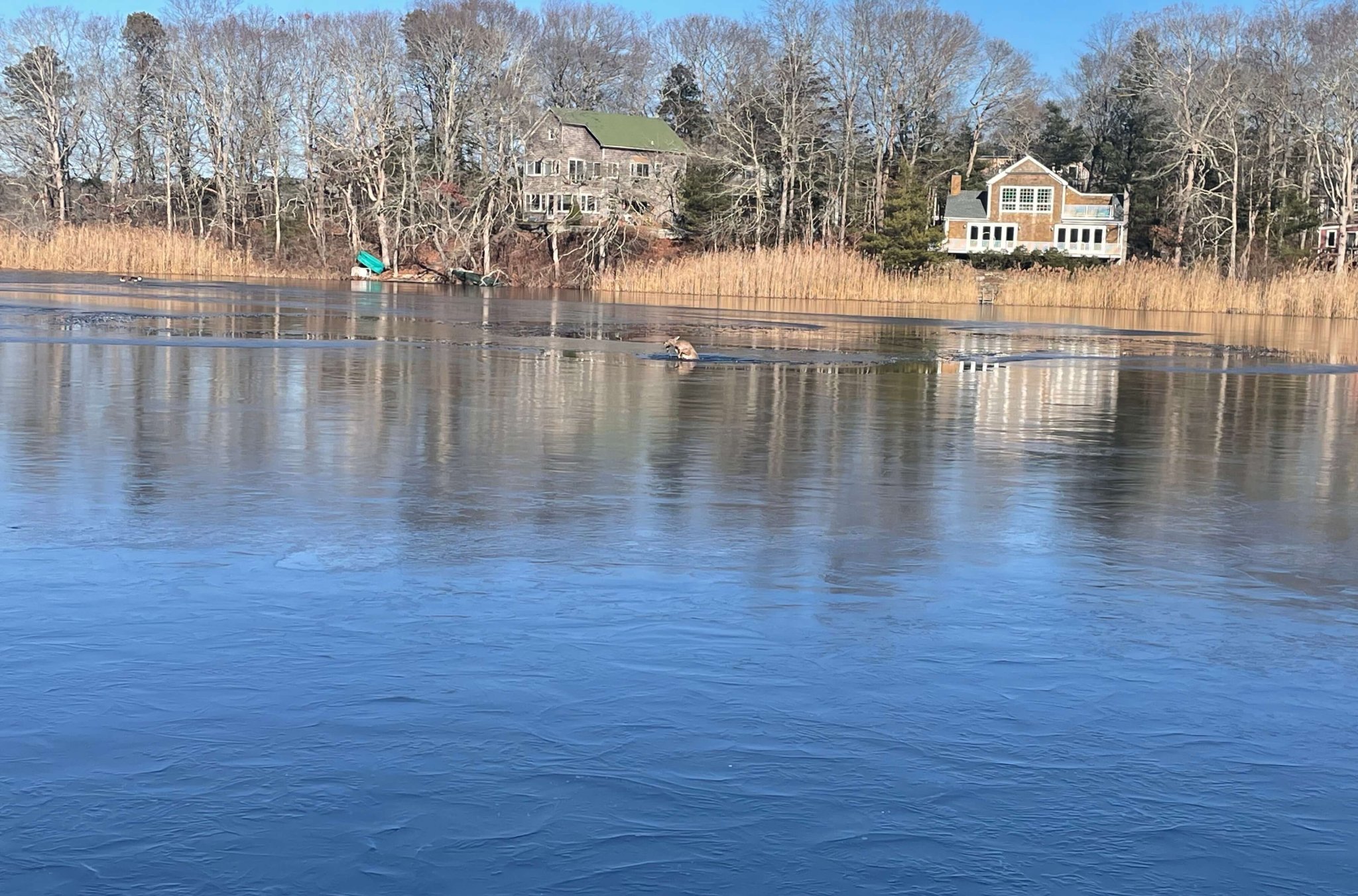Deer Rescued at Big Fresh Pond After Being Stuck in Ice

A couple days before the new year, the Evelyn Alexander Wildlife Rescue Center (EAWRC) received a call about a doe that fell into the ice that covered most of Big Fresh Pond, located in North Sea. White-tailed deer, the most common deer species on Long Island, struggle on ice as their hooves don’t gain enough traction to move well, let alone freezing water. Ryan Gilmartin, animal care assistant and deer rescue teacher of the EAWRC, opted to take the rescue.
“In a situation like this, this kind of rescue isn’t something we’d normally send a regular volunteer out for,” Gilmartin explains, “It’s dangerous and a liability, so I had to see what I could do.”
Thankfully, other than the caller, there were many other people around watching who stayed at the scene, offering to assist. Gilmartin and the surrounding others tied up a bunch of rope, attaching it to a kayak for Gilmartin to take out onto the ice and get the doe out. “It was a difficult situation, the doe kept thrashing around and I couldn’t just get the rope over and on her neck, I had to loop it around a leg as well,” Gilmartin explains.
The doe, suffering from intense hypothermia and panic, continued to thrash around violently as Gilmartin approached, kicking the kayak while submerging herself under the icy water.
”She became trapped beneath the ice,” Gilmartin adds, “but I managed to grab her by the legs and pull her out. She was still trying to escape, so I had to hold her still until she lost all her energy and was tired out.”
Once the doe was successfully secured with the rope, the people nearby started to pull her towards the shore. However, it wasn’t over. “The doe was being pulled a little too fast,” Gilmartin continues, “and while she was struggling, she got caught underneath the ice all over again.” Despite being in a small kayak while facing freezing temperatures, Gilmartin headed over and successfully got the doe out from underneath once more.
Eventually, both the doe and Gilmartin managed to get back onto solid ground. Wrapped in blankets to combat the hypothermia, the doe finally began to calm down and warm up. Gilmartin, after, administered medication to sedate her for transport, since deer are highly nervous animals and are prone to stress during such situations.
Back at the EAWRC, Gilmartin was joined by Senior Animal Care Technician and Hospital Supervisor Jessica Chiarello, along with EAWRC co-worker Alexa Mack to assess the doe’s condition. “Keeping adult deer in rehabilitation is challenging,” Gilmartin explains, “especially given our limited space. If an adult deer is healthy enough to go back in the wild, we’ll send it out immediately, especially now because we are full with deers in rehabilitation.” He continues to add, “I could tell she was fine, she had a lot of energy. When I opened the rescue van, she nearly ran off and I had to jump on her to hold her down.” After determining the doe was clearly healthy enough for release, the EAWRC decided to bring her back to a wooded area near the pond for release.
Although the rescue was successful, it definitely wasn’t easy. During the initial attempt, Gilmartin in his kayak, and the doe, became stuck in the ice about halfway across the pond. One of the helpful bystanders had to paddle out in another kayak to reattach the rope and bring Gilmartin and the doe safely back to shore.
“This was a team effort,” Gilmartin continues. “This rescue would not have been really possible without the help of the people who were nearby and called in the deer.”
While Ryan has extensive experience in rescuing deer, this was his first time dealing with one trapped on ice and in water. As the temperatures drop and water continues to freeze over, check to see if there are any signs of struggle with wildlife so that an EAWRC rescuer can get to it before the situation becomes dire.
The center is located at 228 West Montauk Highway, Hampton Bays. It can be reached at 631-728-4200, and animal emergencies can be reported at 631-728-WILD (9453). The center is open 9 a.m.–5 p.m. seven days weekly. Visit wildliferescuecenter.org for info.



